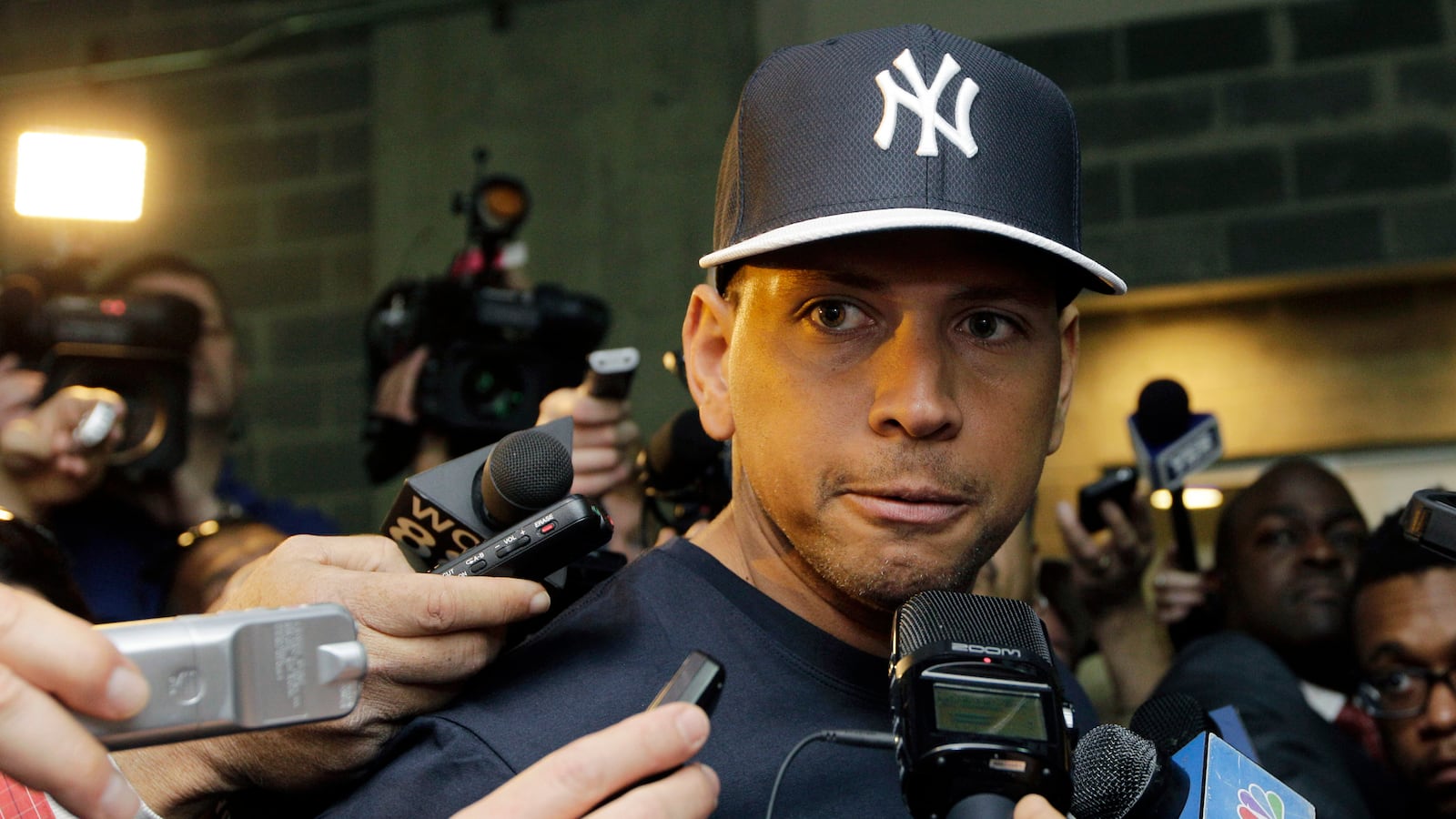Alex Rodriguez’s suspension for the rest of the Major League Baseball season and the next was announced Monday. If all goes according to plan, Rodriguez will be following up with an appeal of that punishment. And in a few hours, Rodriguez’s name may be announced as the starting third baseman for the New York Yankees for the first time this year. A screenwriter couldn’t get away with this plot.

Rodriguez’s life story should have been one pleasant conversation-starter: “arguably the greatest baseball player of his generation.” And what a generation! Deeper than any other in talent. From the day he entered the league, Rodriguez was distinguished by his otherworldly power and prowess. He awed like a demigod, he stirred the crowd’s passions and was resented as one. On Monday he falls like one.
When Commissioner Bud Selig and Major League Baseball announce the names and terms of the suspensions related to their investigation of Florida’s Biogenesis clinic, Rodriguez will be portrayed as an underhanded steroid kingpin. While other suspended players will miss 50 games and be eligible to return should their team make the playoffs, he will likely miss more than 200. Among the rumored evidence used to punish him under the league’s Joint Drug Agreement: receipts, emails, and texts that reportedly show he obtained and used banned performance-enhancing drugs every year since he pleaded with “the American people” to “judge me from this day forward.” Because the drug agreements spells out a lifetime ban for third-time offenders, it will be argued that A-Rod got off easy.
Ten other players may have their suspensions announced Monday as well, inevitably altering playoff races down the stretch. Because of the number of players involved in the Biogenesis drug scandal, and the era-defining action by the league against them Monday will be compared to a date 92 years and two days earlier. That’s when MLB banned for life eight players on the Chicago White Sox who collaborated with gamblers to throw the 1919 World Series, including “Shoeless” Joe Jackson, who still holds the White Sox batting average and triples records.
That “banned for life” sentence has been discussed plenty in the past week, but it seems only to have been a bargaining chip MLB used to get Rodriguez to accept his punishment quietly. Selig will not risk awakening the wrath of the players association, the once-formidable MLBPA, by invoking his extraordinary powers to do as he pleases in “the best interests of baseball.”
For Rodriguez, 38, the suspension is a disaster. First there’s the $34 million in salary he will lose between this year and the next. Perhaps more devastating will be abandoning the dream of breaking Barry Bonds’s all-time home-run record, an event the Yankees’ PR department and moralizing baseball columnists once craved. And the pain of simply “being out” should not be underestimated. Rodriguez loves and lives the game. When he gets home from the stadium he studies other games, he re-watches the Yankees telecasts, and the next day offers compliments to play-by-play announcers on their calls. He is completely aware that he will never be appreciated simply for his superhuman ability to play baseball.
The suspension gives official sanction to those who dismiss the naturally gifted Rodriguez as an overpaid “phony.” That word has been trailing him for years—the way he promotes himself, the way he interacts with other players and the media, the way he played in the playoffs. That “phoniness” is the product of faults, writes David Roth, who describes Rodriguez as “both crushingly self-conscious and world-historically vain; smart enough to know how he should act and yet somehow incapable of convincingly acting that way.”
The pro-Rodriguez case would go something like this: he came up during an era of rampant, overlooked, and never-punished steroid abuse. That was when the Mark McGwire—Sammy Sosa home-run chase inspired Bonds to load up on drugs designed to beef up cattle, and he promptly reeled off a number of record-destroying seasons in San Francisco. MLB’s testing regime may have seemed to Rodriguez as much for show as its previous bans. He never adapted to the new culture.
And besides, cheating and amphetamine abuse are an integral part of baseball’s golden ages. Fans of today adore the cheaters of the past, precisely because of their chicanery. And from one angle, MLB’s methods look astonishingly cynical. Who else could be so cold as to pay for the cooperation of drug dealers against the users and then offer to defend those dealers from the feds? And what better issue with which to divide the players’ association? It’s unclear what effect steroids had on the game. Didn’t expansion deplete pitching talent? A close reading of the statistics shows that the number of “home runs on contact” surged suspiciously for only three years, between 1999 and 2002.
Now the Biogenesis suspension is going to become part of baseball’s mythology too, a focal point for debating an era of the game and its stars. And while many will be exultant or raging after this historic discipline is announced, the most appropriate emotion is probably sadness. Fans of a certain age grew up marveling at SportsCenter highlights of Ken Griffey Jr., Dave Justice, and a young Bonds. It was supposed to be a time of super-athletes whose superior training, nutrition, and dedication would make for a new generation of sports heroes. Rodriguez was above every one of them in ability and drama. The greatest talent ever, the biggest ego, the largest contract, the most crushing disappointment, the longest suspension, the worst fall from the top. Everything is small ball after this.






